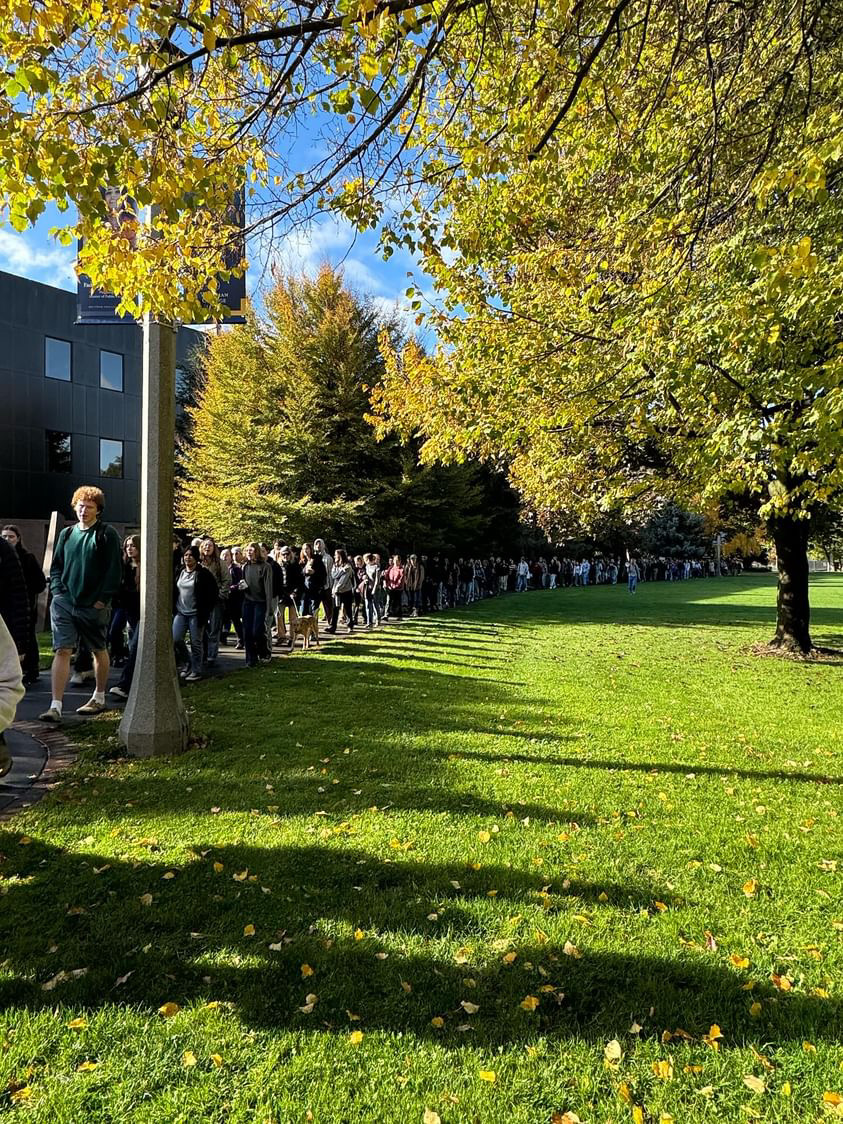
On Wednesday, Oct. 25 at 10:30 a.m., approximately 150 students gathered outside Penrose Library in support of Palestine following the recent escalation of conflict between Israel and Hamas. Whitman’s protest, organized by Whitman Students for Justice in Palestine (WSJP), joined more than 100 other campuses nationwide to call for divestment from organizations funding Israeli weapons and a ceasefire in Gaza.
The walkout at Whitman corresponded with others across the nation; the Palestinian Youth Movement served as a point of contact for WSJP.
The walkout began with a gathering outside of Penrose; students then followed the sidewalk towards Maxey Hall before walking up the stairs to Memorial Hall. Participants gathered on the second floor foyer, sitting against the walls and in the stairwells.
WSJP leadership led the group in chants before turning over the microphone to participants.
Students demanded concrete responses from administration, arguing that messages that have circulated via email aren’t enough.
First-year Gracie Rosen emphasized the urgency of student demands by drawing on their own Jewish heritage.
“I’m sick of people ignoring a genocide because our people have been through a genocide. And it’s already happening again. We can’t let that continue,” Rosen said.
At approximately 11:15 a.m., President of Whitman College Sarah Bolton began to respond to demonstrators. She reinforced the importance of student activism and recognized the harm, worry and concerns about safety students are facing. Speaking without the megaphone, Bolton asked how the campus community could move forward together.
In a statement to The Wire, Vice President for Communications Gina Zandy Ohnstad agreed with Bolton and reaffirmed the College’s commitment to hearing student voices.
“Whitman College administrators are always happy to engage in dialogue and discuss the concerns of students,” Ohnstad said in an email to The Wire.
As students spoke and stomped, Bolton outlined three options to continue discussion: move to a larger space, continue hearing student voices in the Memorial foyer or work in smaller teams to address individual demands. The protest remained in Memorial until students dispersed at approximately 11:40 a.m.
Throughout the walkout, organizers outlined several demands, including divestment from businesses that support Israel and revisions to listserv moderation policies. Other emphases included eliminating College-sponsored off-campus study opportunities in Israel and broader recognition of Whitman’s role as a colonial institution.
Senior Alissa Berman is Head of Commuications for WSJP. She explained that although conversation on divestment has been front-facing this fall, conversations began at least a year ago. She explained that the work to divest has been placed on students; a responsibility that Bolton reaffirmed at the protest by encouraging students to approach the Board of Trustees themselves.
Berman sees divestment as a space where fiscal responsibility intersects with student interests.
“Our frustration … is that we believe that the college has a responsibility to know where their money is going. We think that shouldn’t just be on students,” said Berman. “But at the same time, we think that if the school isn’t able or willing to understand where their own money is going, that’s a [separate] problem they should be concerned with.”
Rosen said that putting the work of researching divestment back onto students follows a broader pattern of students providing labor that should instead be an administrative priority.
“They’ve always put the onus on students, specifically students of color for so, so, so long,” Rosen said. “It’s going to take [many] more demonstrations like these and conversations like these. But, I know, [that] I for one am not going to stop coming to stuff like this.”
An additional demand made by students was the revision of the College’s listserv moderation policy, citing concerns about censorship. As the conversation moved towards the policy, set by the Office of Communications, Ohnstad joined Bolton and the gathered students in the Memorial foyer at approximately 11:30 am.
Students asked Ohnstad to explain the moderation process for emails sent to the student listserv, alleging that the policy has been selectively applied to different organizations and groups on campus. One email in particular was indicted as a gross violation of policy.
Ohnstad explained that the moderation process is dependent on human intervention, and that an email that should not have made it through the process was inadvertently shared with the student body. As soon as the mistake was realized, Ohnstad said that the message was pulled from the student listserv digest.
“Specifically speaking to the student group Students for Justice in Palestine, 17 emails from that group have been sent via the “Announcements” listserv in October and 22 have been sent through the “Students” listserv. In a few cases, emails originally sent by SJP didn’t meet our guidelines, but we worked with the sender to find ways to get the information out while meeting the guidelines. All events that SJP sent through the “Students” listserv did, ultimately, get shared through the listserv,” Ohnstad said in an email to The Wire.
Berman said that WSJP leadership has requested a meeting with the Office of Communications and Dean of Students Kazi Joshua to discuss the censorship WSJP has experienced. The time and date of the meeting has been repeatedly changed.
“There’s been some frustration that [the] administration has been stringing us along a little bit. We haven’t been able to meet with them despite them originally telling us that we could. But, that said, the meeting currently is scheduled for next Tuesday [Oct. 31],” Berman said.
Ohnstad confirmed that a meeting has been scheduled.
“While plans were already underway to meet with members of the leadership team of Students for Justice in Palestine, today’s gathering in Memorial gave us an opportunity to hear from the group as a whole,” Ohnstad said in an email to The Wire.
Following discussion of the listserv moderation policy, a student speaker asked Bolton to recognize the conflict in Palestine as a genocide; Bolton did not answer, citing that the question was beyond her expertise.
First-year Jack Bingaman disagreed with Bolton’s deflection.
“Sarah Bolton should have acknowledged what’s going on in Palestine as a genocide and the fact that she didn’t speaks more than if she just hadn’t said anything at all,” Bingaman said.
The United Nations is yet to call the violence in Palestine a genocide; in an Oct. 19 press release, UN experts call Israel’s actions crimes against humanity and say the events pose a “risk of genocide.”
The UN Convention on the Prevention and Punishment of the Crime of Genocide defines genocide as “any of the following acts committed with intent to destroy, in whole or in part, a national, ethnical, racial or religious group: killing members of the group; causing serious bodily or mental harm to members of the group; deliberately inflicting on the group conditions of life calculated to bring about its physical destruction in whole or in part; imposing measures intended to prevent births within the group; forcibly transferring children of the group to another group.”
Regardless of how the violence is classified by international organizations, news media and humanitarian organizations are classifying the actions taken against Palestinians as war crimes. The intentional destruction of civilian property, targeting of hospitals and educational centers and forced displacement of civilians are included in the International Criminal Court’s definition of war crimes. Genocide is considered to be the most serious of war crimes and is difficult to prosecute in international courts.
Junior Jasper Brown is a member of WSJP. He left the protest feeling unsatisfied.
“We came with concrete demands and we wanted a concrete response,” Brown said. “We wanted actual affirmations that work would be done, which we did not get at all.”
Although Berman was left feeling similarly disappointed, she still saw the protest as successful.
“I think we did what we wanted to do. We wanted to mobilize students. We wanted to show [the] administration that we are here. We have students behind us. It’s not just ten people who care. There are a lot of people who really care about this, and we’re here to make our voices heard.”
Although physically distant from events in Palestine, Bingaman hoped that Palestinians knew that college communities were rallied in their favor.
“I hope that it’s encouraging for people out in Palestine to know that they’re not alone. That there are strangers across the world that are fighting for them on a campus where a lot of them don’t have a stake in the matter,” Bingaman said.
First-year Stella Bracken had not interacted with WSJP or protested on campus prior to Wednesday. Her feelings on the protest were similar to Brown’s in that no firm conclusions were made or steps forward articulated.
“It felt great [to protest], but also disappointing because I just don’t know if it’ll go anywhere …,” Bracken said. “There’s a genocide going on in Palestine. To have that swept under the rug until we’re having to knock at [Bolton’s] door, at admin’s door, is so frustrating,” Bracken said.
“[Administration not] know[ing] whether they can … speak on it is such a privileged take. When you have the privilege to not educate yourself on something that is happening right now is [to be] extremely detached from the world that we’re living in right now. It’s a complete disrespect to students that have personal attachment to situations in Palestine,” Bracken said.
Sophomore Kennedy Reynolds said that protest serves as one of the most effective ways to ensure that student voices are heard and College policy changes.
“It’s only when we force it in [administration’s] faces and force them to come face to face and take responsibility for the things that they’re choosing to ignore that we can actually get real change or even start moving towards real change,” Reynolds said.
Brown and Berman agreed, and said that public support is key.
“Today shows the administration that we’re very serious about this cause because people are dying every single day. Hundreds of children die every single day in Gaza. The people on campus and the Palestinian students on campus are not represented and are being silenced,” Brown said.
“Our power is in numbers, and our power is in our shared voices,” Berman said. “If you weren’t there, that’s okay – we hope to see you next time. If you were there, thank you so much for helping raise up our voices, and showing the administration that together we do have more power than them.”
